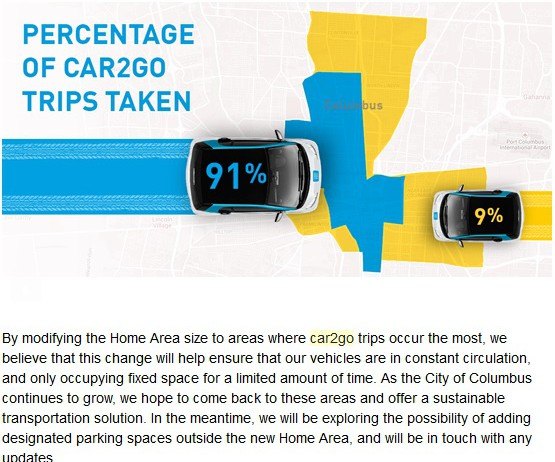No Fixed Abode: Whatcha Gonna Do When They Don't Come For You?

Might as well admit it: I have an unhealthy fascination with the service known as car2go. It’s just so… improbable. I’m pretty sure it began as a way to dump some Smart “ForTwo” inventory into service so the Daimler-Benz lines could keep operating at something like capacity. Since its inception, the service has been in near-constant flux: adding and removing services, changing the fees in predictable and unpredictable ways, suffering service outages, and generally perplexing its customer base, of which I am a devoted and unusually enthusiastic member.
car2go‘s newest change, communicated to me via email yesterday, concerns a significant reduction in their service area. After confirming that my usual lunch runs remain possible, I thought no more about it.
For a while, anyway.
In that sense, car2go is to me what the idea of marriage was to the writer Mary Gordon: “a harbor into which one may sail in and out as one wishes, in perfect safety and confidence.” When I need it, I use it. When I don’t, I don’t. And unlike Zipcar, there is no annual fee or minimum usage, so I pay nothing to have the option available. Not a bad deal, really. In that respect, it’s much like public transport. As an example, I find myself using the subways in New York City perhaps a dozen times a year, if that. It would be ridiculous for me to pay any sort of annual fee for access to the subway. I assume that my use of the subway fits into a pattern of usage that is calculated and accounted for by the shadowy masters of the MTA and that therefore I am free to rely on the subway’s existence while offering it no security or assurances in return.
I’d be remiss if I did not contrast that to the uneasy relationship most Americans have with their employers in the modern world, where we are expected to sacrifice everything from our health to our relationships with our children to obey the employer’s every whim while at the same time passively accepting the employer’s right to terminate us the minute we are what The Wire’s Avon Barksdale referred to as a little slow, a little late. “And how,” Barksdale asks his cousin, “you ain’t gonna never be slow? Never be late? You can’t plan through no shit like this, man. It’s life.” We live our dingy-collar lives tied to our employers through a “Bring Your Own Device” policy that charges us with the responsibility of paying for our own 24/7 electronic shackles and expects us to be grateful as a result.
“I’m so happy,” a friend of mine said, as she waved around an iPhone that cost her six hundred dollars and which she primarily used to read her work email, “that I don’t have to carry two phones around all day.” But do any of us remember the day when we carried around no phones at all? Oh, well. If you don’t like it, vote for Bernie Sanders, assuming anybody is going to let him finish a speech in the near future without treating him like Kanye treated Taylor Swift. Back to the matter at hand.
I do not depend on car2go. But that does not mean that nobody depends on car2go. For some people who live in the service area and primarily need a car to travel to work or run occasional errands, it could replace a personally owned car. You can do the math like this. Let’s say you live three miles from your job. When the weather is good, you walk. Two days a week in most seasons and four days a week in winter, you use car2go. By my calculations, using car2go you can expect to pay about $1,100 a year for those trips. Add a weekly shopping trip of similar distance and you’re up to $1,500. If you work downtown in any city with a parking density issue, which is pretty much everywhere but Detroit nowadays, it’s cheaper to take the car2go to and from work than it is to park your own car downtown. In fact, I can’t think of any scenario where someone can own, operate, and insure an automobile of any reliability whatsoever for $1,500 a year.
For our hypothetical users, car2go functions much like public transportation. But it’s better, because it runs on your schedule, it’s flexible, and it’s far safer than taking public transportation. Particularly at night, and particularly if you’re not the master of nine martial arts and a champion of the Frank Dux Underground Kumite that I know every single reader of the B&B probably is. So I’m not surprised to read that people have sold their cars to rely on the service.
With the recent service-area shrinkages in Columbus and many other car2go cities, however, some of those people are now out in the cold. And since “moovel”, the Daimler spinoff that operates car2go, is a private service, there’s no appealing this decision. You aren’t going to go to a town hall meeting and get your car2go back the way you and your neighbors might be able to pressure a transit authority into restoring service to a particular area. There are numerous benefits to car2go’s private status — the fact that homeless people don’t defecate in the cars they way they do in and around public transit in San Francisco is one of them — but the downside is that you’re just the customer, not a stakeholder in the enterprise.
The nice people at car2go have the right to change their service area to exclude six percent of their customers, the same way FedEx has the right to tell you they can’t or won’t deliver to a certain address too far away from their offices. But it’s a worthwhile reminder of two facts. The first fact is that, for those who can afford it, there is absolutely no substitute for privately owned transportation. No public or part-time solution will ever match the convenience of getting in your own car and going where you want to go on your timeline. And while I understand that doing so is intergalactically expensive in Manhattan and Los Angeles and Chicago, for most of the country it’s so much better than any of the alternatives that virtually any sacrifice is justified to keep it.
The second fact is this: we live now in a world where “disruptive enterprises” like Uber move faster and travel lighter than any publicly-operated competition or governmental regulation can predict or anticipate. As the forces aligned against private automobile ownership gain strength and momentum, we are no doubt going to hear how it’s totally fine for you, Joe Average, to abandon your car in favor of roving electric taxis or cloud-computed ride-sharing services or surge-demand rentals or human-scale Amazon drones or who knows what. But before you turn in your keys for the last time, think long and hard about the fine print in your submission. What is convenient and profitable today might not be convenient and profitable tomorrow. When you hand over your travel sovereignty to parties unknown, make sure they’ll come when you call, okay?

More by Jack Baruth
Latest Car Reviews
Read moreLatest Product Reviews
Read moreRecent Comments
- Tassos Isn't this just a Golf Wagon with better styling and interior?I still cannot get used to the fact how worthless the $ has become compared to even 8 years ago, when I was able to buy far superior and more powerful cars than this little POS for.... 1/3rd less, both from a dealer, as good as new, and with free warranties. Oh, and they were not 15 year olds like this geezer, but 8 and 9 year olds instead.
- ToolGuy Will it work in a Tesla?
- ToolGuy No hybrid? No EV? What year is this? lolI kid -- of course there is an electric version.
- Tassos No, this is for sure NOT my favorite Caddy. Very few Caddys with big fins work out as designs.FOr interiors, I much prefer the Caddys and other US luxury cars from the 30s, Packards etc. After the war, they ditched the generous wood veneer (without which no proper luxury car) for either nothing or the worse than nothing fake wood.For exterior, I like many Caddys from the 60s and early 70s, when the fins slowly diminished and finally disappearedEven the current " Art and Science" angular styling is quite good and has lasted a quarter century (from the first CTS). They even look better than most Bangled BMWs and even some Mercs.- from outside only.
- ToolGuy Good for them.


































Comments
Join the conversation
I frequently used the free Car2Go membership given to all Target Corporate employees (prior to the 1,700 person layof in March, which forced me to relocate to Milwaukee for work - talk about a step backward in cities, moving from Minneapolis). Milwaukee rant aside (no really, it's not nearly as good as Minneapolis), the Car2Go membership was exceptionally handy. I lived downtown and while it was only a mile to work, I was still far enough away from the skyway entry to justify how miserably cold it gets in the winter walking outside. When I didn't Uber (which I stopped after all the awful cab driver's started), I used the Car2Go. It was convenient, but I could see how it adds up price wise. The only issue I ever had with it was the day of a big meeting. I had found a spot outside of Target HQ, parked it, and the car absolutely would not end the trip. I ended up sitting out there in -20 below weather for close to 35 minutes on the phone with Car2Go, who pretty much had me hop on one leg, sing a song backwards, and do a snow dance to get the car to find 'signal.' I never used it again after that, but when I go back and visit, I plan on it...just not in the winter.
I was actually pretty happy with Car2Go when I first signed up two years ago. The service has gotten steadily worse since then. Prices kept going up. Additional fees kept appearing. The final straw was that in August they drastically reduced the area where the cars are available, which means my home in South Denver is no longer anywhere near anywhere you can use a Car2Go. Of course, Car2Go stubbornly refuses to issue me a refund, reserving its right to “increase or decrease the size of, amend, suspend, or terminate its operating areas in North America.” Don’t make the same mistake I did! Use Uber or Lyft or public transportation instead -- it's cheaper, and as an added bonus, you won’t have to drive the car yourself.